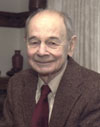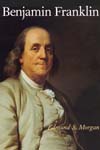A Revolutionary American: Edmund S. Morgan on Benjamin Franklin
 |
|
Edmund S. Morgan
|
Edmund S. Morgan, Sterling Professor of History Emeritus at Yale University, has written more than a dozen books, including Inventing the People: The Rise of Popular Sovereignty in England and America, a Bancroft Prize winner. In his latest book, Benjamin Franklin (Yale), this distinguished historian tackles one of the more enigmatic figures in American history. Morgan's fascinating biography creates an extraordinary portrait of Franklin, unveiling the man beneath the legend.
BTW recently interviewed Morgan via e-mail.
BTW: Franklin's accomplishments were astounding: He was a great statesman, he played a pivotal role in founding a country, he was a scientist, a bestselling author, a printer, a diplomat, a ladies' man, just to highlight some of the facets of the man. It's hard to find a modern-day comparison.
EM: Hard to find, but behind his accomplishments was an intelligence that is rare at any time. I am sure there are people today with equally acute minds and with some of the same curiosity, and that they are responsible for the scientific discoveries of our time.
 BTW: When researching the book, were you surprised by some of the things you found out about Franklin?
BTW: When researching the book, were you surprised by some of the things you found out about Franklin? EM: Yes, Franklin is full of surprises. I think the most surprising to me was the nature of his pragmatism: a willingness to suppress his own views in favor of getting things done that his constituents wanted.
BTW: Franklin is a man of contradictions. He wrote of virtue and spirituality, though it seems that wealth and power were driving forces in his life. Also, there was his desire for an all-white, or English, America, which seems at odds with his historic reputation. Did you like Franklin as a person?
EM: I liked Franklin as a person immensely. Wealth was certainly not a driving force with him. Power may have been, but, if so, he took pains not to show it. Was he racist or xenophobic? Probably in the same way his contemporaries were, but he learned to hate slavery before most of them did. But he is not an easy man to understand.
BTW: It's ironic that Franklin, this great American Revolutionary, cherished being an Englishman for most of his life, and he loved France above all other countries. Furthermore, the government that came to be in America really wasn't the government that he envisioned.
EM: Ironic, yes, but he was ready for American independence from England before most other Americans, perhaps because, after 10 years in England, he knew, before his countrymen did, that England would not change its policies toward America.
BTW: Most history books tend to follow a linear, chronological path, starting from year one and so on. That wasn't really the case here. Your book seems almost conversational, which makes both it and Franklin more accessible to the reader. Was this your intention?
EM: I have become more and more addicted to a conversational, colloquial style, because it is the most easily understood mode of communication. And it tends to prevent a linear approach to things.
BTW: How long did it take for you to research and write Benjamin Franklin?
EM: Research and writing took seven or eight years.
BTW: Why such a short biography?
EM: I write short books, I guess, because I don't have the patience to read many long ones myself, and I try hard not to use two words where one will do.
BTW: Do you know what your next book is going to be about?
EM: No, I don't know, but have in mind trying to understand how Americans could carry on a war against the British from April 1775 to July 1776 without declaring independence.
BTW: On a more personal note, can you tell us what book you are currently reading?
EM: I am reading Annping Chin's Four Sisters of Hofei [Scribner] and recommend it strongly. --Interview by Dave Grogan

